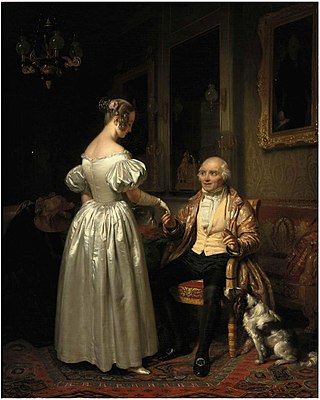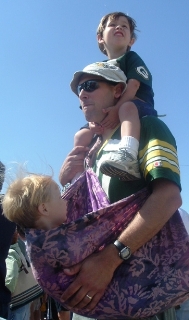Patrilineality, also known as the male line, the spear side or agnatic kinship, is a common kinship system in which an individual's family membership derives from and is recorded through their father's lineage. It generally involves the inheritance of property, rights, names, or titles by persons related through male kin. This is sometimes distinguished from cognate kinship, through the mother's lineage, also called the spindle side or the distaff side.
A gender role, also known as a sex role, is a social role encompassing a range of behaviors and attitudes that are generally considered acceptable, appropriate, or desirable for a person based on that person's sex. Gender roles are usually centered on conceptions of masculinity and femininity, although there are exceptions and variations.
Promiscuity is the practice of engaging in sexual activity frequently with different partners or being indiscriminate in the choice of sexual partners. The term can carry a moral judgment. A common example of behavior viewed as promiscuous by many cultures is the one-night stand, and its frequency is used by researchers as a marker for promiscuity.

A father is the male parent of a child. Besides the paternal bonds of a father to his children, the father may have a parental, legal, and social relationship with the child that carries with it certain rights and obligations. A biological father is the male genetic contributor to the creation of the infant, through sexual intercourse or sperm donation. A biological father may have legal obligations to a child not raised by him, such as an obligation of monetary support. An adoptive father is a man who has become the child's parent through the legal process of adoption. A putative father is a man whose biological relationship to a child is alleged but has not been established. A stepfather is a non-biological male parent married to a child's preexisting parent, and may form a family unit but generally does not have the legal rights and responsibilities of a parent in relation to the child.

Virginity is the state of a person who has never engaged in sexual intercourse. The term virgin originally only referred to sexually inexperienced women, but has evolved to encompass a range of definitions, as found in traditional, modern and ethical concepts. Heterosexual individuals may or may not consider loss of virginity to occur only through penile-vaginal penetration, while people of other sexual orientations often include oral sex, anal sex, or manual sex in their definitions of losing one's virginity.

Masculinity is a set of attributes, behaviors, and roles associated with men and boys. Masculinity can be theoretically understood as socially constructed, and there is also evidence that some behaviors considered masculine are influenced by both cultural factors and biological factors. To what extent masculinity is biologically or socially influenced is subject to debate. It is distinct from the definition of the biological male sex, as anyone can exhibit masculine traits. Standards of masculinity vary across different cultures and historical periods.
The men's rights movement (MRM) is a branch of the men's movement. The MRM in particular consists of a variety of groups and individuals who focus on general social issues and specific government services which they say adversely impact—or in some cases structurally discriminate against—men and boys. Common topics discussed within the men's rights movement include family law, reproduction, suicides, domestic violence against men, circumcision, education, conscription, social safety nets, and health policies. The men's rights movement branched off from the men's liberation movement in the early 1970s, with both groups comprising a part of the larger men's movement.

Parental leave, or family leave, is an employee benefit available in almost all countries. The term "parental leave" may include maternity, paternity, and adoption leave; or may be used distinctively from "maternity leave" and "paternity leave" to describe separate family leave available to either parent to care for small children. In some countries and jurisdictions, "family leave" also includes leave provided to care for ill family members. Often, the minimum benefits and eligibility requirements are stipulated by law.

Virility refers to any of a wide range of masculine characteristics viewed positively. Virile means "marked by strength or force". Virility is commonly associated with vigour, health, sturdiness, and constitution, especially in the fathering of children. In this last sense, virility is to men as fertility is to women. Virile has become obsolete in referring to a "nubile" young woman, or "a maid that is Marriageable or ripe for a Husband, or Virill".

Sociology of the family is a subfield of the subject of sociology, in which researchers and academics study family structure as a social institution and unit of socialization from various sociological perspectives. It can be seen as an example of patterned social relations and group dynamics.
Men's studies is an interdisciplinary academic field devoted to topics concerning men, masculinity, gender, culture, politics and sexuality. It academically examines what it means to be a man in contemporary society.

A stay-at-home dad is a father who is the main caregiver of the children and is generally the homemaker of the household. The female equivalent is the stay-at home-mom or housewife. As families have evolved, the practice of being a stay-at-home dad has become more common and socially acceptable. Pre-industrialization, the family worked together as a unit and was self-sufficient. When affection-based marriages emerged in the 1830s, parents began devoting more attention to children and family relationships became more open. Beginning with the Industrial Revolution, mass production replaced the manufacturing of home goods; this shift, coupled with prevailing norms governing sex or gender roles, dictated that the man become the breadwinner and the mother the caregiver of their children.
The gender pay gap in the United States is a measure between the earnings of male and females in the workforce. When calculating the pay gap, non-adjusted versus adjusted pay gap is utilized. The adjusted pay gap takes into consideration the differences in hours worked, occupations chosen, education and job experience, whereas the non-adjusted pay gap is the overall difference of gross hourly earnings of males and females in the United States. The non-adjusted average female annual salary is around 80% of the average male salary, compared to 95% for the adjusted average salary.
The men's movement is a social movement that emerged in the 1960s and 1970s, primarily in Western countries, which consists of groups and organizations of men and their allies who focus on gender issues and whose activities range from self-help and support to lobbying and activism.

LGBT parenting refers to lesbian, gay, bisexual, and transgender (LGBT) people raising one or more children as parents or foster care parents. This includes: children raised by same-sex couples, children raised by single LGBT parents, and children raised by an opposite-sex couple where at least one partner is LGBT.
The paternal age effect is the statistical relationship between the father's age at conception and biological effects on the child. Such effects can relate to birthweight, congenital disorders, life expectancy and psychological outcomes. A 2017 review found that while severe health effects are associated with higher paternal age, the total increase in problems caused by paternal age is low. While paternal age has increased since 1960–1970, this is not seen as a major public health concern.
Men's Studies Press (MSP) was an academic publisher registered in Harriman, Tennessee, from 1992. They produced three journals, and also published monographs and collections of essays. MSP also administered a website – MensStudies.info – of resources related to men's studies. They ceased publishing in 2016.

A man is an adult male human. Prior to adulthood, a male human is referred to as a boy.
Patriarchy is a social system in which positions of dominance and privilege are primarily held by men. It is used, both as a technical anthropological term for families or clans controlled by the father or eldest male or group of males and in feminist theory where it is used to describe broad social structures in which men dominate over women and children. In these theories it is often extended to a variety of manifestations in which men have social privileges over others causing exploitation or oppression, such as through male dominance of moral authority and control of property. Patriarchal societies can be patrilineal or matrilineal, meaning that property and title are inherited by the male or female lineage respectively.
Masculism or masculinism may variously refer to ideologies and socio-political movements that seek to eliminate sexism against men, equalize their rights with women, and increase adherence to or promotion of attributes regarded as typical of males. The terms may also refer to the men's rights movement or men's movement, as well as a type of antifeminism.









